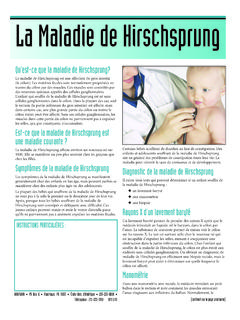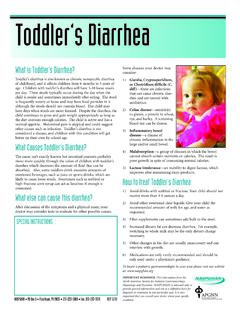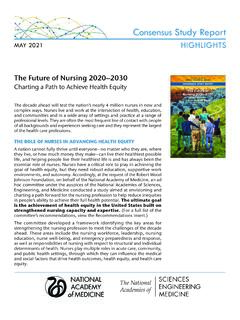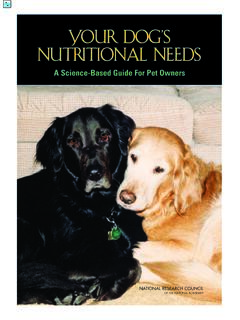Transcription of Parent’s Take Home Guide to GERD - GiKids
1 Parent s Take Home Guide to GERD (Gastroesophageal Reflux Disease)SPIT HAPPENS (0 -24 month olds) Reflux and Your BabyGastroesophageal Reflux (GER) occurs when stomach contents are spit back up or vomited into the esophagus, the tube that connects the mouth to the stomach. GER is very common in in-fants. Most babies with GER are happy and healthy even though they spit up or vomit. Spitting up tends to peak at 4 months and most infants stop spitting up by 12 months of your baby is spitting up without discomfort and is gaining weight appropriately, then there is probably no more evaluation or testing that is that you can do at home to help reduce spitting up: Avoid overfeeding1. Don t feed the baby again after he or she spits up - wait until the next Consult your doctor to see if the baby is taking appro-priately sized bottles or nursing the appropriate amount of time.
2 For formula fed infants,feedings can be thickened {l tablespoon of rice ce-real per ounce of formula)1. Pinch the top of the nipple between the thumb and index Make a small slit in the top of the nipple with the corner of a sterile razor blade. The blade allows for accurate cutting, and prevents shredding of the Start with a small slit, and enlarge as needed until the formula is flowing easily. In formula-fed infants,try a hypoallergenic formula for 2 weeks Keep infant upright for at least 30 minutes after meals Avoid car seat positioning in the home Avoid tight diapers and elastic waistbands Avoid exposure to tobacco smokeMost infants with GER will be helped with the treatment men tioned above. If symptoms are severe or persistent then your pri mary care provider may consider treatment with a medication or referral to a pediatric Symptoms of Reflux Disease in Infants (0 - 24 months old)(Symptoms experienced by your infant.}
3 1. Vomiting associated with Blood Green or yellow fluid2. Inconsolable or Severe Crying and Irritability3. Persistent Food Refusal Poor growth or failure to thrive Difficulty eating 4. Breathing Problems Difficulty breathing Repeat bouts of pneumonia Breathing stops Turning blue Chronic cough Wheezing Frequent chokingIf you have concerns, speak to your healthcare provider. IMPORTANT REMINDER: This information from the North American Society for Pediatric Gastroenterology, Hepatology and Nutrition ( NASPGHAN ) and the NASPGHAN Foundation is intended only to provide general information and not as a de-finitive basis for diagnosis or treatment in any particular case. It is very important that you consult your doctor about your child s specific turn over to the back for the take-home guides for older children and teens with S UP WITH MY KID S STOMACH?
4 (2 -12 year olds) Reflux and your ChildGastroesophageal Reflux (GER) occurs during or after a meal when stomach contents go back into the tube that connects the mouth to the children are able to decrease their reflux with lifestyle and diet changes: Have your child eat smaller meals more often Avoid eating 2 to 3 hours before bedtime Elevate the head of the bed 30 degrees Avoid carbonated drinks, chocolate, caffeine, and foods that are high in fat (french fries and pizza) or contain a lot of acid (citrus, pickles, tomato products) or spicy foods Avoid large meals prior to exercise Help your child lose weight if he or she is overweight Avoid exposure to tobacco smokeMost children with GER will be helped with the treatment men-tioned above. If symptoms are severe or persistent then your pri-mary care provider may consider treatment with a medication or referral to a pediatric Symptoms of Reflux Disease in Children (2 - 12 year olds)(Symptoms experienced by your child.)
5 1. Repeated vomiting associated with Blood Green or yellow fluid Weight loss or poor weight gain 2. Frequent sensation of food or liquid coming up into the back of the throat or mouth 3. Frequent discomfort in the stomach or chest 4. Swallowing problems Discomfort with the act of swallowing Pain with swallowing Sensation that food gets stuck on the way down 5. Breathing Problems Wheezing Chronic cough or recurrent pneumonia Hoarseness AsthmaIf you have concerns, speak to your healthcare AND TIRED OF BEING SICK (13+ years) Reflux and your TeenGastroesophageal Reflux (GER) occurs during or after a meal when stomach contents go back into the tube that connects the mouth to the stomach. Most teenagers are able to decrease their reflux with lifestyle and diet changes: Have your teenager eat smaller meals more often Avoid eating 2 to 3 hours before bedtime Elevate the head of the bed 30 degrees Avoid carbonated drinks, chocolate, caffeine, and foods that are high in fat (french fries and pizza) or contain a lot of acid (citrus, pickles, tomato products) or spicy foods Avoid large meals prior to exercise Help your teen lose weight if he or she is overweight Avoid cigarette smoking Avoid drinking alcoholMost teens with GER will be helped with the treatment men-tioned above.
6 If symptoms are severe or persistent then your pri-mary care provider may consider treatment with a medication or referral to a pediatric Symptoms of Reflux Disease in Teenagers (13+ years old)(Symptoms experienced by your teen.) 1. Repeated vomiting associated with Blood Green or yellow fluid Weight loss or poor weight gain 2. Frequent sensation of food or liquid coming up into the back of the throat or mouth 3. Frequent discomfort in the stomach or chest Heartburn 4. Swallowing problems Discomfort with the act of swallowing Pain with swallowing Sensation that food gets stuck on the way down 5. Breathing Problems Wheezing Chronic cough or recurrent pneumonia Hoarseness AsthmaIf you have concerns, speak to your healthcare provider.
7 YOUR SOURCE FOR PEDIATRIC REFLUX and GERD INFORMATIONS upport for this project was provided by Takeda Pharmaceuticals.











